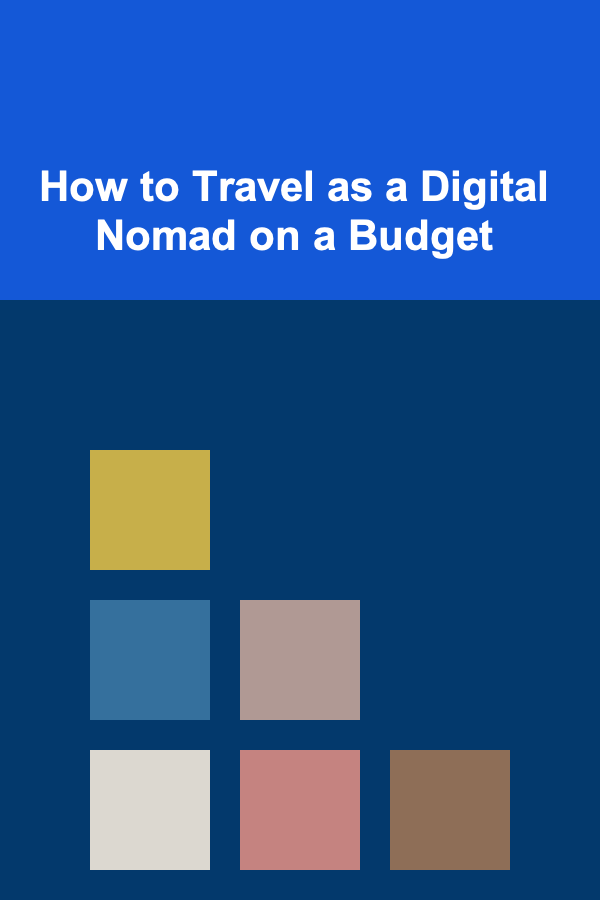
How to Travel as a Digital Nomad on a Budget
ebook include PDF & Audio bundle (Micro Guide)
$12.99$7.99
Limited Time Offer! Order within the next:

In recent years, the digital nomad lifestyle has become a popular way of life for many who want to combine work with travel. Being a digital nomad means working remotely while traveling the world, taking advantage of various online tools and platforms. However, one common misconception is that traveling as a digital nomad is expensive. In fact, it is possible to maintain a frugal lifestyle while exploring the world, as long as you plan your travels wisely and make intentional decisions about where to live and how to spend money.
In this article, we will explore strategies and tips on how to travel as a digital nomad on a budget, from choosing affordable destinations and finding budget accommodation to maximizing your income while minimizing expenses.
Choosing the Right Destinations
The first and most important step in traveling as a digital nomad on a budget is choosing destinations that are affordable to live in. While certain cities like New York, London, or Tokyo may be top-tier destinations, they are also known for being costly. As a digital nomad, your goal is to strike a balance between living in an exciting place and managing your expenses. Fortunately, there are countless affordable destinations around the world that offer excellent living conditions, internet speeds, and coworking spaces.
Emerging Digital Nomad Hotspots
Southeast Asia: Southeast Asia has long been known as a popular region for budget-conscious travelers and digital nomads alike. Cities like Chiang Mai (Thailand), Bali (Indonesia), and Ho Chi Minh City (Vietnam) offer low living costs, reliable Wi-Fi, and a community of fellow remote workers. These places boast beautiful landscapes, vibrant culture, and affordable food and accommodation.
Eastern Europe: Eastern Europe has become increasingly popular with digital nomads due to its low living costs, rich history, and fast internet. Cities like Kraków (Poland), Budapest (Hungary), and Tbilisi (Georgia) offer affordable housing, good healthcare, and plenty of opportunities for cultural exploration.
Latin America: Latin American countries like Mexico, Colombia, and Argentina provide affordable living conditions and a rich cultural experience. Cities like Mexico City, Medellín, and Buenos Aires have established themselves as digital nomad hubs, offering coworking spaces, reliable internet, and a relatively low cost of living.
Consider Local Living Costs
When choosing a destination, consider the following factors to determine if it's budget-friendly:
- Accommodation: Look for areas where rent is relatively low, and where you can find long-term rental options that are more affordable than short-term tourist accommodations.
- Food: Eating out at local restaurants is often much cheaper than in western countries. Opting for street food or home-cooked meals can save you a significant amount of money.
- Transportation: Public transportation systems in some countries are highly affordable. Consider using buses, metro systems, or bicycles rather than taxis or rideshare services.
- Currency exchange rates: Choose countries where the exchange rate is favorable to your home currency, allowing you to stretch your budget further.
Accommodation Options for Digital Nomads
Accommodation is often one of the largest expenses for digital nomads, but there are ways to significantly reduce this cost without compromising comfort or safety.
Airbnb and Short-Term Rentals
Airbnb can be an excellent option for digital nomads, especially if you prefer having a private space where you can work comfortably. By booking longer stays (30 days or more), you can often secure discounts on Airbnb properties. In many cases, these longer stays come with significant cost savings compared to booking shorter rentals or hotels.
Coworking Spaces with Accommodation
Some coworking spaces around the world offer all-inclusive packages that include accommodation, meals, and access to the coworking facilities. These types of spaces are designed for digital nomads, offering both affordable living and access to high-speed internet and a community of fellow remote workers. Look for coworking spaces that provide accommodation in cities where you want to stay for an extended period.
Hostels and Shared Housing
Hostels are often associated with backpackers, but they can also be an affordable and social option for digital nomads. Many hostels now have coworking spaces and reliable internet, allowing you to work while meeting new people. Shared housing, where you rent a room in a house with others, is another affordable option. Websites like Roomster, Facebook groups, and local classifieds are excellent resources for finding shared housing opportunities.
House-Sitting and Pet-Sitting
House-sitting or pet-sitting can be a great way to live rent-free while traveling. Websites like TrustedHousesitters connect travelers with homeowners who need someone to look after their property or pets while they are away. In exchange for taking care of the house or pets, you get free accommodation, making it an ideal budget-friendly option.
Digital Nomad Villages
A growing trend in the digital nomad community is the creation of "digital nomad villages" -- places where remote workers can live and work together in a supportive and affordable environment. These villages often include shared accommodation, coworking spaces, and a tight-knit community of digital nomads. Examples of such villages include Laia, an eco-village in Mexico, and Nomad List's curated list of affordable destinations worldwide.
Maximizing Income Streams
As a digital nomad, it's essential to have reliable sources of income to sustain your travels. Fortunately, there are numerous ways to earn money remotely. The key is to diversify your income streams so that you can rely on multiple sources rather than just one. Here are some ways to maximize your earning potential while keeping your expenses low:
Freelancing
Freelancing is one of the most popular ways to earn a living as a digital nomad. Platforms like Upwork, Fiverr, and Freelancer allow you to offer your skills and services to clients worldwide. Whether you're a writer, designer, programmer, or marketer, freelancing allows you to work from anywhere and take on projects that fit your skill set and schedule.
Remote Jobs
Many companies are now offering fully remote positions. These jobs can range from customer service and sales roles to technical positions in IT, design, and development. Websites like Remote.co, We Work Remotely, and AngelList are excellent resources for finding remote job opportunities in a variety of fields.
Passive Income
Building passive income streams can help you sustain your travels without having to actively work all the time. Some digital nomads build passive income through investments (stocks, real estate, etc.), affiliate marketing, or content creation (e.g., blogging, YouTube, or creating online courses).
Teach English or Other Skills
Teaching English online is another popular income stream for digital nomads. Websites like VIPKid and iTalki allow you to teach English to students in non-English-speaking countries. If you are fluent in other languages or have expertise in a particular subject, you can also offer tutoring services remotely.
Managing Your Budget and Finances
Once you have established your sources of income, it's essential to manage your finances efficiently to ensure that your budget remains on track. Here are some budgeting tips for digital nomads:
Track Your Expenses
Use budgeting apps like YNAB (You Need A Budget) or Mint to keep track of your income and expenses. This allows you to identify areas where you can cut back and adjust your spending according to your priorities.
Set a Monthly Budget
Determine a reasonable monthly budget based on your income and destination. Factor in accommodation, food, transportation, health insurance, entertainment, and other expenses. Adjust your budget as needed based on fluctuations in income or unexpected costs.
Pay Attention to Taxes
As a digital nomad, you may be required to pay taxes in both your home country and the country where you are working. Research tax laws in the countries where you live and work to avoid surprises. In some cases, you may be able to take advantage of tax treaties or foreign earned income exclusions.
Use Digital Payment Methods
To save on international banking fees and currency conversion costs, use digital payment methods such as PayPal, TransferWise, or Revolut. These services allow you to transfer money between countries with low fees and favorable exchange rates.
Get Travel Insurance
Travel insurance is a crucial expense for digital nomads. Look for comprehensive plans that cover medical expenses, emergency evacuations, lost luggage, and canceled flights. While travel insurance may seem like an added expense, it can save you a lot of money in the long run if something unexpected happens.
Living Like a Local
To truly make the most of your budget while traveling as a digital nomad, embrace the local culture and lifestyle. Avoid touristy areas, which tend to be more expensive, and instead explore local neighborhoods, markets, and attractions.
Eat Local Food
Eating out at touristy restaurants can quickly eat away at your budget. Instead, opt for local eateries or street food stalls, which are not only more affordable but also provide a more authentic experience. Cooking your own meals or buying ingredients at local markets is another way to save money.
Use Public Transportation
Using public transportation is an excellent way to save money on travel. Many cities have affordable metro, bus, and tram systems. In addition to saving money, public transportation allows you to experience the city like a local.
Engage in Free Activities
Many cities offer free or low-cost activities, including walking tours, hikes, local festivals, and cultural events. Research free attractions or look for events that align with your interests to experience the local culture without breaking the bank.
Staying Productive on the Road
As a digital nomad, maintaining productivity while on the road is essential. Finding a balance between work and travel can be challenging, but with the right mindset and tools, you can remain focused on your professional tasks without sacrificing your exploration time.
Find Comfortable Workspaces
Whether you prefer working in a coworking space, a local café, or your Airbnb, find environments that allow you to stay focused and productive. Ensure that you have reliable internet access and a comfortable place to work.
Time Management
To balance work and travel, it's important to manage your time effectively. Create a schedule that allows you to accomplish your work tasks while also making time to explore your destination. This will help you maintain productivity and make the most of your travels.
Embrace Flexibility
One of the biggest benefits of being a digital nomad is the flexibility to work from anywhere. Embrace this flexibility and adjust your schedule as needed. Sometimes you may have to work longer hours to explore a destination during off-peak times, but that's part of the nomadic lifestyle.
Conclusion
Traveling as a digital nomad on a budget is entirely possible with careful planning and smart decision-making. By choosing affordable destinations, finding budget accommodation, maximizing your income, and managing your finances effectively, you can create a lifestyle that allows you to work remotely and travel the world without breaking the bank. The key is to be resourceful, adaptable, and open to new experiences, and you'll find that the digital nomad lifestyle can be both fulfilling and financially sustainable.

How to Find Affordable DIY Home Decor Inspiration
Read More
How to Keep Your Home Safe During Construction or Renovations
Read More
How to Onboard Employees for Success in Their First 90 Days
Read More
How to Use Your Typing Skills for Content Writing and Blogging
Read More
How To Brew Session Beers and Low ABV Options
Read More
How to Maintain Your Rollerblades for Peak Performance
Read MoreOther Products

How to Find Affordable DIY Home Decor Inspiration
Read More
How to Keep Your Home Safe During Construction or Renovations
Read More
How to Onboard Employees for Success in Their First 90 Days
Read More
How to Use Your Typing Skills for Content Writing and Blogging
Read More
How To Brew Session Beers and Low ABV Options
Read More